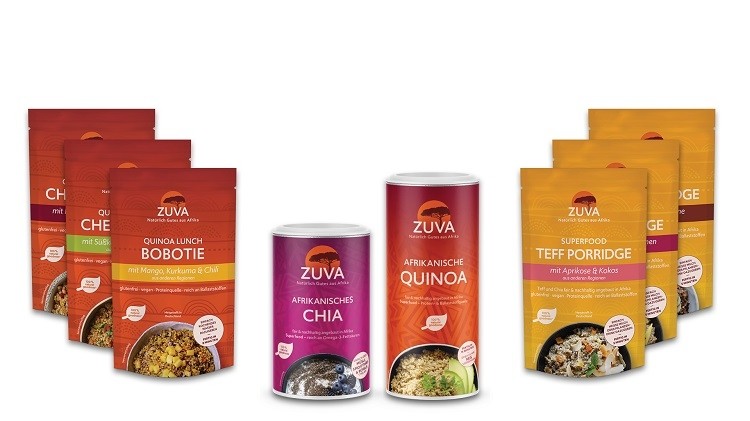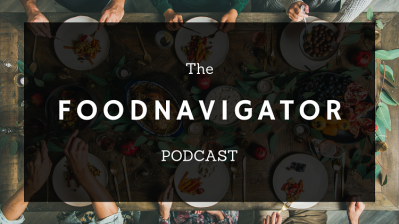Farmer to fork: Growing ‘forgotten crops’ in Africa for European consumers

German food brand ZUVA isn’t a conventional start-up. Whereas traditionally, entrepreneurs begin with the finished product, and work back along the supply chain, ZUVA has done the opposite.
By starting with the raw ingredient – and more specifically, raw ingredients grown by parent company Amatheon Agri in Zambia, Uganda and Zimbabwe – the start-up is claiming full traceability from farm to fork.
Starting on the farm…
The ZUVA story is inextricably linked to agricultural business and parent company Amatheon Agri, explained founder and CEO Carl Heinrich Bruhn.
Coming from a farming and food production background himself, Bruhn established Amatheon Agri in 2011 to explore the ‘untapped potential’ of African agriculture.
Combining the continent’s ‘unique resources’ with ‘know-how expertise’ and financing from Europe, the CEO sought to play his part in addressing the key problem facing current agri-food players: that of feeding growing populations within planetary boundaries.
Starting with Zambia, before expanding into Uganda and Zimbabwe, today Amatheon Agri grows a wide range of crops, including soy, wheat, maize, potatoes, rice, sesame, and chillies, as well as some lesser known varieties.
“First, we started selling into local markets, with product commodities such as soy, maize, and wheat,” the CEO explained. “The next step was to produce for export markets, where we wanted to tap into healthy food trends.”
It was at this point that Amatheon Agri expanded into chia seeds, quinoa and moringa. These ‘interesting crops’ fit into ‘global nutritional trends’, explained Bruhn, who described the expansion as representative of the company’s ‘ongoing story with innovation’.
Amatheon Agri works with 4,000 small scale farmers across Zambia. Through its Outgrower Programme, the agribusiness offers free training to farmers, fixed-price contracts, credit in the form of seeds, and organic certification in Organic Grower Groups by certification body ECOCERT.
Tapping into forgotten seeds and grains
European appetites for these so-called forgotten crops are growing, as an increasing number of consumers turn to plants for protein, instead of meat.
At the same time, statistics show that allergies – such as gluten intolerance and coeliac – are becoming increasingly common.
Otherwise known as ancient or orphan crops, a number of these forgotten seeds and grains feed into both trends. Protein-rich quinoa and chia (both originally grown in South America), and teff are all naturally gluten-free, making them attractive alternatives for those leading a lifestyle of health and sustainability (LOHAS), Bruhn told FoodNavigator.

From an environmental standpoint, soy, teff, quinoa, and moringa, all make it into Unilever and WWF’s Future 50 Foods report, which throws the spotlight on the 50 plant-based foods we should be eating more of, the CEO elaborated.
While selling these crops in bulk to the international market, Amatheon Agri saw potential to round-out the entire ‘farmer to fork’ supply chain and reach consumers’ plates.
“I could see how exciting a brand could be,” said Bruhn, who cut his teeth in the German dairy industry. “With a brand, you can differentiate yourself from others. You can do your own storytelling and safeguard your innovation.”
Bringing African flavours to Europe
The Amatheon Agri founder also saw a gap in the German market for African flavours. The latest line of products to be launched by ZUVA – which means ‘sun’ in the African Shona language – includes quinoa lunch bowls and teff porridges.
The Bobotie lunch bowl is flavoured with mango, turmeric and chilli, the Chermoula ready meal is flavoured with sweet potato and coriander, and ZUVA’s Chakalaka quinoa bowl is spiced with cumin and chilli.
In the teff porridge range, the start-up has also rolled out three flavours: mango & hemp seed, cocoa & banana, and apricot & coconut.
“Consumers are responding very well,” Bruhn told this publication, citing particular interest from the ‘adventurous consumer’ – one that is excited by new and exotic flavours.

ZUVA is currently selling direct to consumer, with the view to partnering with national retailers once the coronavirus pandemic eases.
The CEO is also looking abroad for potential sales channels within Europe and beyond. “We are looking into European markets as well as the UK, and also see the US as a fantastic opportunity – particularly when you consider retail chains like [Amazon’s] Whole Foods, which I think our concept and sustainability story is well suited to.
“The vision for ZUVA is definitely a global one.”
























